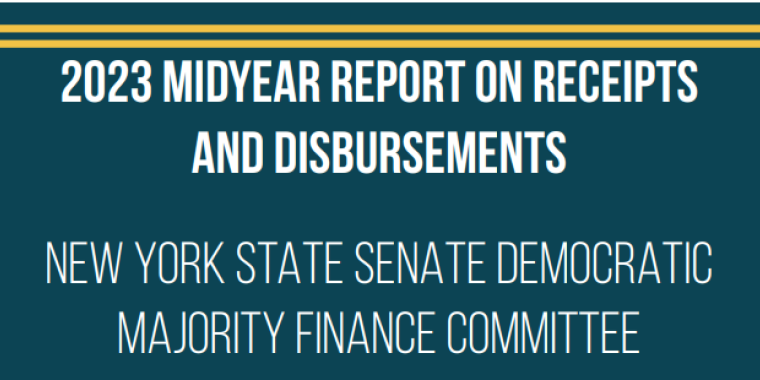
Testimony Before the City Council Committee on Economic Development Regarding Regulation of Corporate Subsidies on May 3rd, 2005
Liz Krueger
July 12, 2010
Good morning. My name is Liz Krueger, and I am the State Senator for New York’s twenty-sixth Senatorial District, one primarily comprising parts of Manhattan’s Midtown and East Side. I would like to thank the Economic Development Committee for affording me the opportunity to speak at today’s proceeding.
City Council Introduction 373a is an important measure, one that would establish new reporting requirements for the Economic Development Corporation, and facilitate more effective scrutiny of City-provided corporate subsidies intended to create and retain jobs. I strongly support this legislation, and have been pursuing similar efforts at the State level, where I have introduced S.2414, the Corporate Accountability for Tax Expenditures Act. I believe that the City and State can and should work together to build a more comprehensive and responsible system for monitoring the extents to which corporate subsidies either succeed or fail, and I welcome this legislation as a critical part of that effort.
Too often, New York State and New York City engage in simultaneous subsidization as both governments grant financial-incentive packages to a single entity for a single project. The State and City must work together to ensure that we are not forfeiting unnecessary aggregate revenue without creating or retaining more jobs that, subsequently, add more value to our economies. Unfortunately, at both levels of government, there is presently far too little oversight of corporate subsidies, making it hard to determine what we are actually getting in return for foregone revenue.
Furthermore, to the extent that there is reporting under the current system, it is clear that neither the City nor State is effectively administering economic development incentive programs. Our economic development strategy has been a defensive policy that reacts to individual companies’ threats to leave, and has resulted in an overemphasis on the finance and real estate industries. Given that the overwhelming majority of retention deals are crafted to appease the financial services, banking, and insurance industries, most job-oriented financing packages have almost exclusively focused on Manhattan’s central business districts. According to a report issued by Center for an Urban Future entitled “Engine Failure,” these policies have destabilized the City’s economy, ignored the employment needs of most residents, and failed to develop a comprehensive workforce-development strategy. Instead, it is incumbent upon legislators to devise and implement an economic development strategy that emphasizes value and seeks to fortify more sectors of the economy and more regions of the City.
As such, New York City should reassess the commonplace usage of discretionary funding and subsidies for corporate retention deals. Over the past six years, more than $2 billion of New York City and New York State funds have gone to some of the world’s most profitable companies in the name of job retention. Time and time again, New York City has given tax breaks and incentives to corporations—such as Merrill Lynch, Paine Webber, Chase Manhattan Bank, Citicorp, and Viacom—only to be thanked by mergers and layoffs.
One particularly egregious example of a misuse of these subsidies was the appropriation of $650 million in Liberty Bonds (funded through the state-controlled Empire State Development Corporation) and $42 million in city tax breaks funded through the Industrial Development Agency for the construction of a building for Bank of America at Sixth Avenue and 42nd Street. It strains credibility to think that subsidies should be required to encourage development on this midtown plot of land, one which is clearly among the most valuable locations in the entire country. In addition, these subsidies were approved despite the fact that Bank of America had failed to fulfill its obligations under a previous subsidy deal. In 1993, Bank of America asked for $12 million in sales-tax abatements in exchange for a promise to retain 1,700 employees at the World Trade Center. A few years later, the sales-tax deal was terminated when Bank of America merged with Security Pacific National Bank and laid off 800 employees.
In other words, the current system is broken, and it invites a number of valid queries while engendering a reasonable level of concern. My State-level legislation, the Corporate Accountability for Tax Expenditures Act, would help address these issues. The ultimate goal of the Act is to provide a comprehensive record of all economic development incentives that are entered into between state entities and businesses in order for the Legislature and the Governor to make well informed decisions about tax expenditures. The bill mandates that all public-private economic development partnerships entered into by any State agency, public authority, or public benefit corporation be codified as a written agreement and honored by the subsidized party, lest it forfeit eligibility for subsidization. Were a private entity to violate the terms of the agreement, either through dereliction of capital investment or job creation and retention, it would be deemed ineligible for economic assistance. I believe Introduction 373a would accomplish similar goals at the City level, thus creating a more responsible and rational economic development policy. Furthermore, it is my understanding that the latest incarnation of this measure would allow for enhanced review of public-private partnerships by better measuring the kinds of jobs created—in effect, establishing a “job quality” metric—and establishing a methodology committee that could serve as a mechanism for programmatic self-assessment. Both of these improvements would be invaluable.
It is essential to recognize that corporate subsidies increase the tax burden on average New Yorkers and increase pressure to cut essential services by substantially reducing the City tax base. It is also essential that we know what we are getting in exchange for these real losses to government revenues. What we should be getting is a substantial and documented increase in jobs that pay workers a living wage and provide adequate benefits such as health care. Unfortunately, our current system of oversight provides no comprehensive system for ensuring that subsidies are providing these benefits. Introduction 373a would be an excellent step toward creating such a system, and I urge the City Council to act on this important legislation.
Thank you again for the opportunity to testify. I look forward to continuing to work with the City Council to assure that the State and City coordinate efforts to evaluate and rein-in corporate subsidies.
Share this Article or Press Release
Newsroom
Go to NewsroomSenator Krueger's 2023 Virtual Senior Resource Fair Part 2
November 6, 2023

2023 Midyear Report on Receipts and Disbursements
November 6, 2023

Senator Krueger's 2023 Virtual Senior Resource Fair Part 1
November 3, 2023

Sen. Krueger's Message on the Tragedy Unfolding in Israel
October 10, 2023
